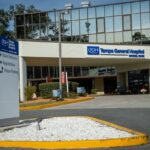Over the past few months, Jackson Memorial Hospital’s Emergency Department has proved it is more than capable of handling an unexpectedpandemic; and now it is already preparing for the next challenge: hurricane season.

As Associate Chief Nursing Officer of the Emergency Department and the Critical Care Units at Jackson Memorial, June Ellis, DNP, MS, RN, believes the hospital has hit a plateau and is definitely seeing a decrease in the amount of patients coming in with the COVID-19 virus. Part of that success is the result of the department’s set-up.
Ellis explained, "Our Emergency Department has a unique design. The original portion has been added onto, so one section is a little older and one is a little newer. The design enabled us to separate high-risk patients into one area, and all other patients into another." In that way, patients are assessed and sent to the area appropriate for their treatment, helping to eliminate cross-contamination.
She also pointed out that in the initial stages of the virus, Jackson erected a tent outside the ED that included a triage group. "Prior to any patient coming in we asked them very specific questions, such as have you had any shortness of breath or a fever, and if they answered yes, we directed them to the tent, maintaining social distancing. We were able to swab them and see if the results were positive or negative, then send the patients inside to the proper area.
"It’s been great. The tent is still open and the staff really has rallied. All nurses here at Jackson have risen to the top, but especially in the Emergency Department, where they are wearing gowns and masks and gloves, and working outside in this heat. Those who are not able to be outside to help are disappointed." Inside the ED, Ellis said staff does not move around but works in the same area to help keep contamination down.
Ellis said that overall, the ED is seeing fewer patients. "A lot of people are working from home, they are not on the highway. Here in South Florida there are a lot of outdoor activities, so our numbers tend to be lower. We still see heart attacks, strokes, but the numbers have definitely decreased."
The good news is that Jackson Memorial is also seeing fewer COVID-19 patients; on the other hand, hurricane season is looming. However, plans for that are already underway. Ellis said, "We actually start planning for hurricane season at the beginning of April. We ask for volunteers who will be here during that time, then we start compiling schedules with who will be working and who will be our relief. Nurses will probably work 48 to 72 hours before they get relief. As an organization we do that early in April, then review and make sure we have enough nurses."
She continued by saying that the ED sees fewer emergencies during a hurricane except for things like strokes or heart attacks. "Most ambulances limit their trips when the wind gets to be 35 to 40 mph, and at 50, they don’t come in at all. Once we have the all-clear, we see more patients – maybe they had been without their medications or something happened while they were boarding up their houses. Jackson is also a dedicated hospital for communities. If someone is on a ventilator or some other life support, we take them in during the hurricane because we’ll always have power, and discharge right after."
The COVID crisis has not gone away, but Ellis said it’s important for people to realize there are different aspects of the virus and they affect people differently. "We see a lot of people who test positive but have minimal effects. There’s no indication to admit them, so we’ll send them home with instructions to take their temperature twice a day, stay hydrated, stay quarantined, come back if they get worse. Others who are a higher risk – the elderly, with high blood pressure, heart disease – the virus has an affinity for them. They may need additional oxygen or need to be put on respirator. We have to admit those individuals, but those are not as many as those who are sent home.
"It’s important for readers to know that if you’re healthy, not overweight, have no heart disease – if you test positive, there’s a good chance you’ll be OK after a few days."
No matter the challenge, Jackson Memorial Hospital’s Emergency Department is ready to help.



























